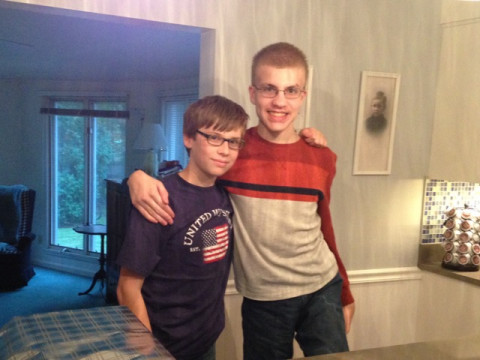
By Lauren Swick Jordan
You’ve all heard it by now – one out of every 45 kids has autism.
With numbers that large, it seems to me that the next logical discussion needs to be around mental health. Mental health of the caregivers, of the siblings, but most importantly, of the person with autism.
We had a scare a few days ago.
My younger son (Peter, 14) and I were bickering – this is nothing new. I said something he didn’t like, or I took away his iPad for some reason. I don’t even remember what the bickering was about. But I do remember the tension in the air. And every time I feel that tension, I worry about TJ, my 15-year-old son with autism. I knew that with that tension in the air, TJ was a ticking time bomb. His sensory system can’t handle it, and it’s only a matter of time before he blows up in anger at his little brother. And it’s always directed at his little brother, no matter who is involved in the tense discussion.
True to form, TJ blew up at Pete. But this time, TJ went after Pete with closed fists, threatening to hit him. When my husband, Sean, intervened, TJ hit Sean. Then kicked him. And as Sean wrapped his arms around our 6 foot tall son to apply some much needed soothing deep pressure and to restrain him against any further blows, TJ hit and kicked and bit as much as he could. It was frightening. Pete cried as Sean and TJ fell to the floor, with TJ still restrained. I sat next to them, speaking in the calmest tone I could muster, directing TJ to breathe. Slow deep breaths, I kept saying, over and over again. Until finally, TJ started taking slow deep breaths, and stopped struggling against Sean’s hold.
It is also true to form that after TJ has such an episode, he stops being angry at whoever he was angry at, and starts being angry at himself. Very angry. He beats himself up, saying how stupid he is, and what a jerk he is. So when he did this we were prepared with some more soothing talking, deep pressure squeezes, and a lot of “We love you”s.
Eventually, an exhausted TJ said he wanted to go to bed. I don’t know why I was so uneasy after he went into his room and shut the door, but I knew to trust my gut instinct and went up after him a few minutes later.
When he didn’t respond to my knock on the door I let myself in. And there was my sweet TJ, opening his second floor bedroom window, so he could jump out.
One call to my child psychiatrist sister later, we were on our way to the emergency room. “They will help you feel better,” I told TJ.
After we were put into a room, TJ laying on a gurney, I saw behavior that I had never seen before. He was silent. He stared straight ahead. He wouldn’t talk at all. And he stayed this way for the hour it took for someone to come see us.
His behavior terrified me. The whole night had terrified me. TJ had gotten mad before, really mad, but he had never tried anything like this before. It scared me so, so much.
Finally, after a while of my offering, TJ agreed to play solitaire on my iPad. And after that his old self came back, slowly. He smiled when he won his game. He talked with the First Call lady to tell his story of what had happened. (Well, until the part that he went after Peter. He asked me to tell the story from there.) He spoke about his intentions in opening the window to go out. And this part lit a light bulb over my head and made me realize that we are dealing with a whole new piece of his mental health that we had never been faced with before:
“I didn’t want to hurt myself. I wanted to get away.”
Wow. I knew his impulse was to flee when he got really angry, but I had no idea that impulse would override the logic that fleeing from a second floor window could result in a serious injury or death.
TJ was diagnosed with anxiety when he was in second grade and it is well handled with medication. With the help of his psychiatrist and pediatrician, we decided after this incident that it was time to raise his dose again to accommodate his recent growth.
I know that many kids on the autism spectrum are diagnosed with at least one psychiatric disorder, and most are usually diagnosed with more than one.
With one in 45 kids on the autism spectrum, are our medical facilities prepared to care for the huge number of kids on the spectrum that will most likely seek help? Are there enough psychiatrists out there to help our kids in an emergency?
I’m scared that the answer for these questions is “no.”
TJ is too. And that’s why I’m writing this today with his permission.
“Maybe it can help another kid, mom,” he said.
I hope so, TJ.
Lauren Swick Jordan is a frequent On Parenting writer and blogs atLaughing…like it’s my job.